Edudrken
On this page, you find all documents, package deals, and flashcards offered by seller edudrken.
- 79
- 0
- 0
Community
- Followers
- Following
1 Reviews received
79 items
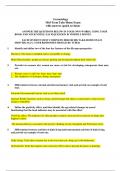
Gerontology Mid-Term Take-Home Exam
Gerontology Mid-Term Take-Home Exam ANSWER THE QUESTIONS BELOW IN YOUR OWN WORDS, USING YOUR BOOK AND YOUR NOTES. EACH QUESTION IS WORTH 5 POINTS. EACH STUDENT MUST COMPLETE HER OR HIS TAKE-HOME EXAM INDIVIDUALLY. YOUR RESPONSES SHOULD BE TYPED. THE ANSWERS ARE PROVIDED FOR EASY REVISION
- Exam (elaborations)
- • 4 pages •
Gerontology Mid-Term Take-Home Exam ANSWER THE QUESTIONS BELOW IN YOUR OWN WORDS, USING YOUR BOOK AND YOUR NOTES. EACH QUESTION IS WORTH 5 POINTS. EACH STUDENT MUST COMPLETE HER OR HIS TAKE-HOME EXAM INDIVIDUALLY. YOUR RESPONSES SHOULD BE TYPED. THE ANSWERS ARE PROVIDED FOR EASY REVISION
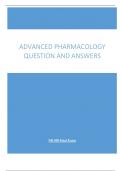
NR 508 - ADVANCED PHARMACOLOGY
Question 1 2 / 2 pts A patient who has diabetes reports intense discomfort when needing to void. A urinalysis is normal. To treat this, the primary care NP should consider prescribing: a) flavoxate (Urispas). b) bethanechol (Urecholine). c) phenazopyridine (Pyridium). d) Oxybutynin chloride (Ditropan XL). This patient is describing urge incontinence, or overactive bladder, which occurs when the detrusor muscle is hyperactive, causing an intense urge to void before the bladder is full. U...
- Exam (elaborations)
- • 39 pages •
Question 1 2 / 2 pts A patient who has diabetes reports intense discomfort when needing to void. A urinalysis is normal. To treat this, the primary care NP should consider prescribing: a) flavoxate (Urispas). b) bethanechol (Urecholine). c) phenazopyridine (Pyridium). d) Oxybutynin chloride (Ditropan XL). This patient is describing urge incontinence, or overactive bladder, which occurs when the detrusor muscle is hyperactive, causing an intense urge to void before the bladder is full. U...
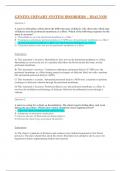
GENITO-URINARY SYSTEM DISORDERS – DIALYSIS
A nurse is educating a client about the different types of dialysis. The client asks which type of dialysis uses the peritoneal membrane as a filter. Which of the following responses by the nurse is accurate? A. "Hemodialysis uses the peritoneal membrane as a filter." B. "Continuous ambulatory peritoneal dialysis (CAPD) uses the peritoneal membrane as a filter." C. "Automated peritoneal dialysis (APD) uses the peritoneal membrane as a filter." D. "Peritoneal dialysis does not use the ...
- Exam (elaborations)
- • 27 pages •
A nurse is educating a client about the different types of dialysis. The client asks which type of dialysis uses the peritoneal membrane as a filter. Which of the following responses by the nurse is accurate? A. "Hemodialysis uses the peritoneal membrane as a filter." B. "Continuous ambulatory peritoneal dialysis (CAPD) uses the peritoneal membrane as a filter." C. "Automated peritoneal dialysis (APD) uses the peritoneal membrane as a filter." D. "Peritoneal dialysis does not use the ...
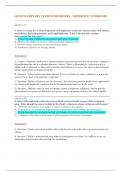
GENITO-URINARY SYSTEM DISORDERS - NEPHROTIC SYNDROME
A nurse is caring for a client diagnosed with nephrotic syndrome who presents with edema, proteinuria, hypoalbuminemia, and hyperlipidemia. What is the priority nursing intervention for this client? A. Assess for signs of infection and initiate appropriate treatment. B. Monitor blood glucose levels to detect potential hyperglycemia. C. Provide dietary education to increase protein intake. D. Administer diuretics to manage edema. Explanation A. Correct. Nephrotic syndrome is characterized...
- Exam (elaborations)
- • 18 pages •
A nurse is caring for a client diagnosed with nephrotic syndrome who presents with edema, proteinuria, hypoalbuminemia, and hyperlipidemia. What is the priority nursing intervention for this client? A. Assess for signs of infection and initiate appropriate treatment. B. Monitor blood glucose levels to detect potential hyperglycemia. C. Provide dietary education to increase protein intake. D. Administer diuretics to manage edema. Explanation A. Correct. Nephrotic syndrome is characterized...
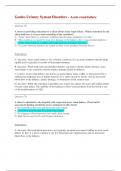
Genito-Urinary System Disorders - Acute renal failure
A nurse is providing education to a client about acute renal failure. Which statement by the client indicates a correct understanding of the condition? A. "Acute renal failure is a chronic condition that develops gradually over time." B. "This condition is caused by long-term damage to the kidneys due to uncontrolled diabetes." C. "Acute renal failure is a sudden and temporary loss of kidney function." D. "It occurs when the kidneys are unable to filter waste products from the blood....
- Exam (elaborations)
- • 23 pages •
A nurse is providing education to a client about acute renal failure. Which statement by the client indicates a correct understanding of the condition? A. "Acute renal failure is a chronic condition that develops gradually over time." B. "This condition is caused by long-term damage to the kidneys due to uncontrolled diabetes." C. "Acute renal failure is a sudden and temporary loss of kidney function." D. "It occurs when the kidneys are unable to filter waste products from the blood....
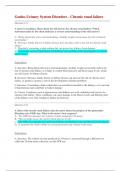
Genito-Urinary System Disorders - Chronic renal failure
A nurse is teaching a client about the risk factors for chronic renal failure. Which statement made by the client indicates a correct understanding of the risk factors? A. "Being physically active and maintaining a healthy weight can increase my risk of chronic renal failure." B. "Having a family history of kidney disease does not play a role in my risk for chronic renal failure." C. "Regularly consuming a high-sodium diet can protect my kidneys from damage." D. "Conditions such as hy...
- Exam (elaborations)
- • 28 pages •
A nurse is teaching a client about the risk factors for chronic renal failure. Which statement made by the client indicates a correct understanding of the risk factors? A. "Being physically active and maintaining a healthy weight can increase my risk of chronic renal failure." B. "Having a family history of kidney disease does not play a role in my risk for chronic renal failure." C. "Regularly consuming a high-sodium diet can protect my kidneys from damage." D. "Conditions such as hy...
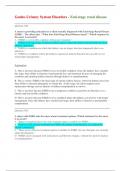
Genito-Urinary System Disorders - End-stage renal disease
A nurse is providing education to a client recently diagnosed with End-Stage Renal Disease (ESRD. . The client asks, "What does End-Stage Renal Disease mean?" Which response by the nurse is accurate? A. "ESRD is a reversible condition with proper treatment." B. "ESRD is the final stage of chronic kidney disease where the kidneys permanently lose their ability to function." C. "ESRD is a condition in which the kidneys can no longer function temporarily due to an infection." D. "ESRD ...
- Exam (elaborations)
- • 31 pages •
A nurse is providing education to a client recently diagnosed with End-Stage Renal Disease (ESRD. . The client asks, "What does End-Stage Renal Disease mean?" Which response by the nurse is accurate? A. "ESRD is a reversible condition with proper treatment." B. "ESRD is the final stage of chronic kidney disease where the kidneys permanently lose their ability to function." C. "ESRD is a condition in which the kidneys can no longer function temporarily due to an infection." D. "ESRD ...
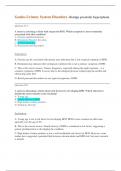
Genito-Urinary System Disorders -Benign prostatic hyperplasia
A nurse is assessing a client with suspected BPH. Which symptom is most commonly associated with this condition? A. Dysuria (painful urination) B. Hematuria (blood in the urine. C. Urinary frequency D. Rectal pain and discomfort Explanation A. Dysuria can be associated with urinary tract infections but is not a typical symptom of BPH. B. Hematuria may indicate other urological conditions but is not a primary symptom of BPH. C. This is the correct answer. Urinary frequency, especially...
- Exam (elaborations)
- • 23 pages •
A nurse is assessing a client with suspected BPH. Which symptom is most commonly associated with this condition? A. Dysuria (painful urination) B. Hematuria (blood in the urine. C. Urinary frequency D. Rectal pain and discomfort Explanation A. Dysuria can be associated with urinary tract infections but is not a typical symptom of BPH. B. Hematuria may indicate other urological conditions but is not a primary symptom of BPH. C. This is the correct answer. Urinary frequency, especially...
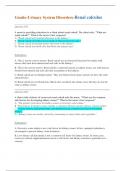
Genito-Urinary System Disorders-Renal calculus
A nurse is providing education to a client about renal calculi. The client asks, "What are renal calculi?" What is the nurse's best response? A. "Renal calculi are bacterial infections in the kidneys." B. "Renal calculi are kidney stones made of mineral and acid salts." C. "Renal calculi are benign tumors that form in the kidneys." D. "Renal calculi are blood clots that block the urinary tract." Explanation A. This is not the correct answer. Renal calculi are not bacterial inf...
- Exam (elaborations)
- • 28 pages •
A nurse is providing education to a client about renal calculi. The client asks, "What are renal calculi?" What is the nurse's best response? A. "Renal calculi are bacterial infections in the kidneys." B. "Renal calculi are kidney stones made of mineral and acid salts." C. "Renal calculi are benign tumors that form in the kidneys." D. "Renal calculi are blood clots that block the urinary tract." Explanation A. This is not the correct answer. Renal calculi are not bacterial inf...
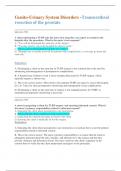
Genito-Urinary System Disorders-Transurethral resection of the prostate
A client undergoing a TURP asks the nurse how long they can expect to remain in the hospital after the procedure. What is the nurse's best response? A. "You will be discharged the same day of the surgery." B. "You may need to stay in the hospital for about a week." C. "Plan to stay in the hospital for at least 2 to 3 days." D. "Hospital stay is usually reserved for patients with complications, so you may go home the same day." Explanation A. Discharging a client on the same day ...
- Exam (elaborations)
- • 19 pages •
A client undergoing a TURP asks the nurse how long they can expect to remain in the hospital after the procedure. What is the nurse's best response? A. "You will be discharged the same day of the surgery." B. "You may need to stay in the hospital for about a week." C. "Plan to stay in the hospital for at least 2 to 3 days." D. "Hospital stay is usually reserved for patients with complications, so you may go home the same day." Explanation A. Discharging a client on the same day ...

ATI_RN_Fundamentals